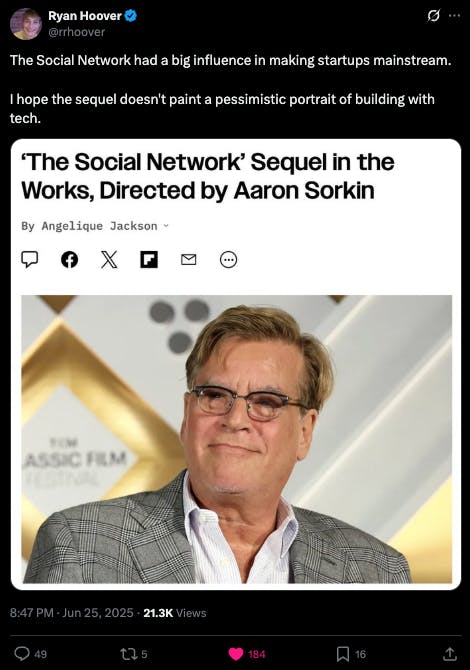| Welcome, Weekenders! In this newsletter: |
| • The Big Read: The deals, free agents and egos fueling the AI talent grab |
| • The Top 5: The most rigorous summer camps |
| • Plus, our Recommendations: A Pablo Escobar tell-all; Netflix’s latest sleuths; and the amazing Gila monster |
| |
| Mamma Mia! Nintendo’s Switch 2, the latest console from the venerable videogame company, is a bona fide hit. |
| Currently, the device is nigh ungettable: Best Buy, Target, GameStop and Walmart had no stock when I checked recently. I’m a little surprised, honestly, because the reviews of the gadget weren’t gushers. Indeed, they all pretty much came to the same conclusion, which The Seattle Times neatly summed up in this headline: “Bigger and better, for a higher price.” Or as NPR’s James Perkins Mastromarino put it: “I don’t think every Nintendo fan will need to upgrade…but if you can afford it now and know that you’ll want one eventually, it’s easy to recommend.” |
| This sort of expensive incrementalism reminds me of something. Oh, yeah—Apple! |
| Now, likening another company to the Cupertino outfit is usually meant as a compliment. That’s not what I’m driving at, though, and at the risk of getting thrown into the bowels of some lava-filled castle, I’ll suggest that if Nintendo keeps on this path, it’ll eventually end up suffering the same fate that has lately befallen Apple: overreliance on plodding iterations at a great risk of customer fatigue—while ignoring the innovation of nimble competitors. |
| Of course, the irony is that Nintendo has won serious brand power for itself by choosing to take its time in developing new consoles until it had perfected something that would shake up the industry. At the moment, it’s coasting on that brand perception. Eventually, there’s only so much more you can fasten onto the same old kart to keep up in the race—so to speak. |
| Kiss and Make Up, Silicon Valley |
| There must be something in the air: Old adversaries are getting chummy. First, Mark Zuckerberg ended years of animosity with Oculus co-founder Palmer Luckey. Then this week, The New York Times reported that Uber may help Travis Kalanick—the company’s co-founder and former CEO, who was ousted by investors in 2017—buy the U.S. arm of Pony.ai, a Chinese autonomous vehicle startup. |
| What’s next: Parker Conrad and David Sacks picnicking in Dolores Park? |
| A Scuttled “South Park” Deal? |
| When some drama arises in the streaming world, I often find myself needing a sheet of scratch paper beside me—to take notes and keep track of who owns what and who’s mad at whom. |
| Case in point: the “South Park” fracas. Let’s see if I can do this fast—time me! |
| For now, Paramount produces and owns the venerable animated series, part of a $900 million deal with show creators Trey Parker and Matt Stone. But Warner Bros. Discovery’s HBO Max has the streaming rights. Recently, Parker and Stone tried to renegotiate the rights with HBO. But then Paramount’s potential new owner, Skydance Media, stepped in. Skydance is owned by Larry Ellison’s son, David, and he wants Paramount to possibly have some of the rights for Paramount+. That disrupts Parker and Stone’s plans. So Parker and Stone are mad at Ellison, and HBO is upset with everyone. Meanwhile, Netflix is buzzing around and is interested in the rights, too. |
| OK, I’m out of breath. But get this: It’s not like Ellison isn’t willing to strike a new big deal with the showrunners. “This next deal would be worth even more on an annual basis,” Bloomberg reports. “And Skydance would like the creators to do more in exchange.” |
| Do more, get paid more. Heck, that’s a better deal than most media hands get.—Abram Brown |
| |
|
|
 |
|
| In the last few weeks, what was already a hiring mania in artificial intelligence has turned into something approaching a feeding frenzy. It’s been accelerated by Mark Zuckerberg’s mad-dash effort to hire everyone he can and catch up to rivals like OpenAI, Anthropic and Google. Make no mistake, though, the craze extends well beyond Meta Platforms and goes industrywide, our Erin Woo reports in this week’s Big Read. And for some in AI, dollars aren’t enough motivation. As one researcher put it: “Why would you go to a less advanced lab just for money?” |
|
 |
|
| Before Larry Page was, well, a gazillionaire Google founder, he was just little Larry at Interlochen Arts Camp in Michigan. Imagine that! And that’s just one of the camps in this guide assembled by frequent Weekend contributor Todd Plummer, all of them places that can turn a rising little star into a supernova. |
| Abram Brown, editor of The Information’s Weekend section, really doesn’t want to suffer through the New York City version of the “Hear me out—what if we move to Miami?” thing. Reach him at abe@theinformation.com. |
| |
 |
| Listening: “Cocaine Air” |
| What would you do in the first few days after getting out of federal prison, where you spent a decade-plus? I can think of a few things—some of them publishable, some unpublishable. But I certainly don’t think I would do what T.J. Dominguez did, which was to sit down with TV producer Jonathan Walton for “Cocaine Air,” a podcast all about Dominguez’s felonious past. |
| Then again, I wouldn’t have done what Dominguez did to get thrown in the clink in the first place: smuggle cocaine for Pablo Escobar. In the early l980s, the Columbian drug lord paid Dominguez $1 million a pop to fly the white magic into America—all while Dominguez ran a Lamborghini dealership by day. That granted Dominguez an Escobar-esque lifestyle, complete with a pet mountain lion, which he called Top Cat. Dominguez insists his descent into the criminal underworld wasn’t his fault. Rather, it was the fault of two unscrupulous Miami bankers who conned him for $100,000. Uh-huh. |
| Reading: “The Salmon Cannon and the Levitating Frog” by Carly Anne York |
| A lot of people in Silicon Valley—and even more down in Hollywood—owe their svelte summer bodies to a scaly lizard, the Gila monster. Let me explain: A couple decades back, a University of Maryland professor became fascinated by the creature and its unique metabolism. See, a Gila monster eats only occasionally, just a handful of times a year, first stunning its eventual supper with a venomous bite. When the professor studied how the venom interacted with the animal’s body while it digested its prey, he noticed it increased pancreatic inflammation as well as the presence of an unusual peptide. Several years later, another researcher used this initial work on the Gila monster venom to finally zero in on the health benefits of GLP-1, the peptide behind Ozempic and the other superpopular weight-loss drugs. |
| “The Salmon Cannon and the Levitating Frog” is filled with such stories, ones that show how much we owe to the natural world and the creatures down the food chain from us. Breeding screwflies and experimenting with cobalt-60 in the mid-20th century enabled the cattle industry to enjoy fatter profits and far healthier herds today. When the U.S. Army closely examined an oyster shell’s interior lining, it wound up developing a new plastic 14 times stronger and eight times lighter than steel. As for the book’s titular device, it’s no weapon of war: The salmon cannon is a contraption invented to fling fish into a body of water, helping to shore up an endangered species’ population. |
| The book is more than a menagerie of history and neat science. It is a rallying cry by author Carly Anne York, an animal physiologist, to better appreciate the world’s lab-coated nerds and superthinkers. In her argument, she posits a pair of delightful questions: “How many people who enjoyed the Greek bathhouses noticed water would spill out of the tub when submerging themselves? Probably many,” she writes. “How many were curious enough to create a mathematical theorem? Just Archimedes.” |
| Watching: “Dept. Q” (Netflix) |
| Every Sherlock needs a Watson. Better yet, multiple Watsons. Truly, the ensemble cast is what gives vitality to “Dept. Q,” which might seem like another grim neo-noir without the many able hands that assist Detective Chief Inspector Carl Morck (Matthew Goode) in this twisty, tweedy whodunit set in Edinburgh, Scotland (one based off a book series by Danish author Jussi Adler-Olsen set in Copenhagen). As “Dept. Q” opens, Morck is recently returning to the force after a gunman nearly killed him and left his partner paralyzed. The near-death experience hasn’t improved his outlook on life, making Morck a veritable thistle in the side of his foul-mouthed captain (a wonderful Kate Dickie). Exasperated by Morck, his commanding officer tricks him into a leaky-pipe exile in the basement, the headquarters of the new cold case unit he must run. |
| Morck eventually fills out the unit with a trio who, naturally, are more than they appear: Akram (Alexej Manvelov), a Syrian refugee who’s been woefully underemployed as a police department IT jockey; Rose (Leah Byrne), a department assistant whose obsessive-compulsiveness makes her a formidable sleuth; and James (Jamie Sives), Morck’s longtime partner, who’s still recovering in the hospital. They land on a whopper of a debut case, and I couldn’t spoil it if I tried, since I’m not entirely sure the plot makes total sense. No matter, though: Showrunner Scott Frank, the Hollywood veteran who created “The Queen’s Gambit” and penned “Logan,” keeps everything moving along quite expertly.—Abram Brown |
| |
|
| …wait, the first one was optimistic? |
 |